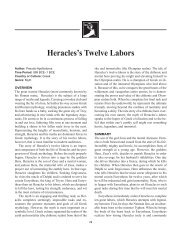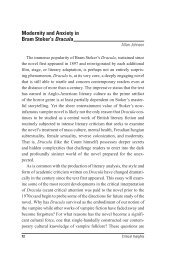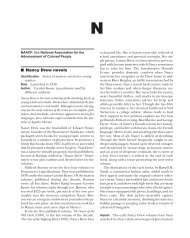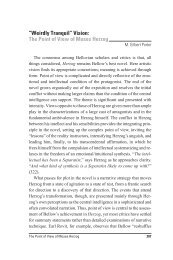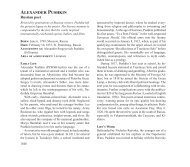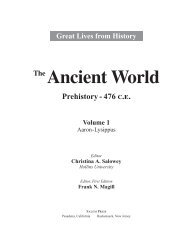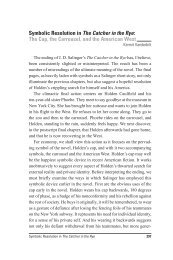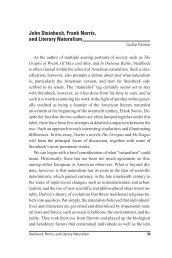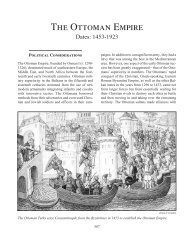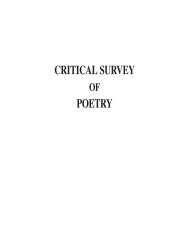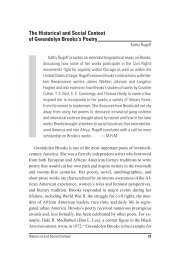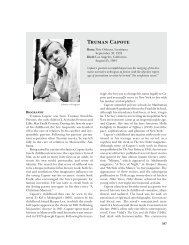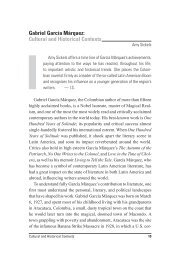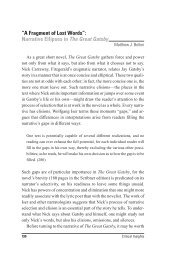Introduction to Poe Criticism Overview: Poe and the ... - Salem Press
Introduction to Poe Criticism Overview: Poe and the ... - Salem Press
Introduction to Poe Criticism Overview: Poe and the ... - Salem Press
Create successful ePaper yourself
Turn your PDF publications into a flip-book with our unique Google optimized e-Paper software.
clearly announced its parodic intent. But when readers <strong>to</strong>ok <strong>the</strong> tale seriously,<br />
<strong>Poe</strong> removed <strong>the</strong> subtitle (Regan 281). “Metzengerstein,” <strong>to</strong>o,<br />
was originally intended as a parody, but many readers <strong>to</strong>ok it as a genuine<br />
tale of <strong>the</strong> supernatural. <strong>Poe</strong> made one attempt <strong>to</strong> smarten his readers<br />
up: republishing in 1836, he added <strong>the</strong> subtitle “A Tale in Imitation<br />
of <strong>the</strong> German” (Thompson “Metzengerstein” 46 <strong>and</strong> n. 57). When<br />
readers persisted in taking <strong>the</strong> tale seriously, however, he removed <strong>the</strong><br />
subtitle, <strong>and</strong> in subsequent republications even <strong>to</strong>ned down or deleted<br />
some of <strong>the</strong> most ridiculous passages.<br />
No reader should decide that <strong>Poe</strong>’s horror tales are not parodies until<br />
he or she reads “How <strong>to</strong> Write a Blackwood Article.” In this unquestioned<br />
parody, a silly woman calling herself Psyche Zenobia, seeking<br />
<strong>to</strong> elevate <strong>the</strong> literature being turned out by <strong>the</strong> society of which she is a<br />
member, turns for advice <strong>to</strong> <strong>the</strong> edi<strong>to</strong>r of Britain’s prominent literary<br />
magazine. He provides a list of rules for constructing tales “full of<br />
taste, terror, sentiment, metaphysics, <strong>and</strong> erudition.” Clearly <strong>Poe</strong> is<br />
having fun at Blackwood’s expense. The second part (sometimes<br />
printed separately under <strong>the</strong> title “A Predicament”) presents Zenobia’s<br />
attempt <strong>to</strong> translate Blackwood’s advice in<strong>to</strong> fiction. It tells of a woman<br />
visiting a ca<strong>the</strong>dral, who gets her head stuck between <strong>the</strong> h<strong>and</strong>s of <strong>the</strong><br />
clock in <strong>the</strong> <strong>to</strong>wer. The tale is ridiculous, yet it reads with <strong>the</strong> same<br />
breathless horror as <strong>Poe</strong>’s “serious” tales of terror. Moreover, <strong>the</strong> parody<br />
was published within a month of “Ligeia” <strong>and</strong> only one year before<br />
“The Fall of <strong>the</strong> House of Usher.” It seems incredible that a writer<br />
could ridicule a style so mercilessly one month <strong>and</strong> <strong>the</strong>n employ it in<br />
complete seriousness <strong>the</strong> next.<br />
Against <strong>the</strong> background of <strong>Poe</strong>’s <strong>to</strong>tal output, it is easy <strong>to</strong> see why<br />
many <strong>Poe</strong> critics are more inclined than general readers <strong>to</strong> see parody<br />
<strong>and</strong> hoaxing in tales like “Usher.” Indeed <strong>Poe</strong>’s hoaxing has become a<br />
central focus of <strong>Poe</strong> scholars, who have addressed it from a variety of<br />
perspectives. It is not simply that hoaxing helps explain o<strong>the</strong>rwise confusing<br />
features (<strong>and</strong> presumed faults) in <strong>Poe</strong>’s work. More <strong>and</strong> more,<br />
<strong>Poe</strong>’s hoaxing seems an essential part of what he is about. Many of <strong>the</strong><br />
<strong>Introduction</strong> <strong>to</strong> <strong>Poe</strong> <strong>Criticism</strong> 49



